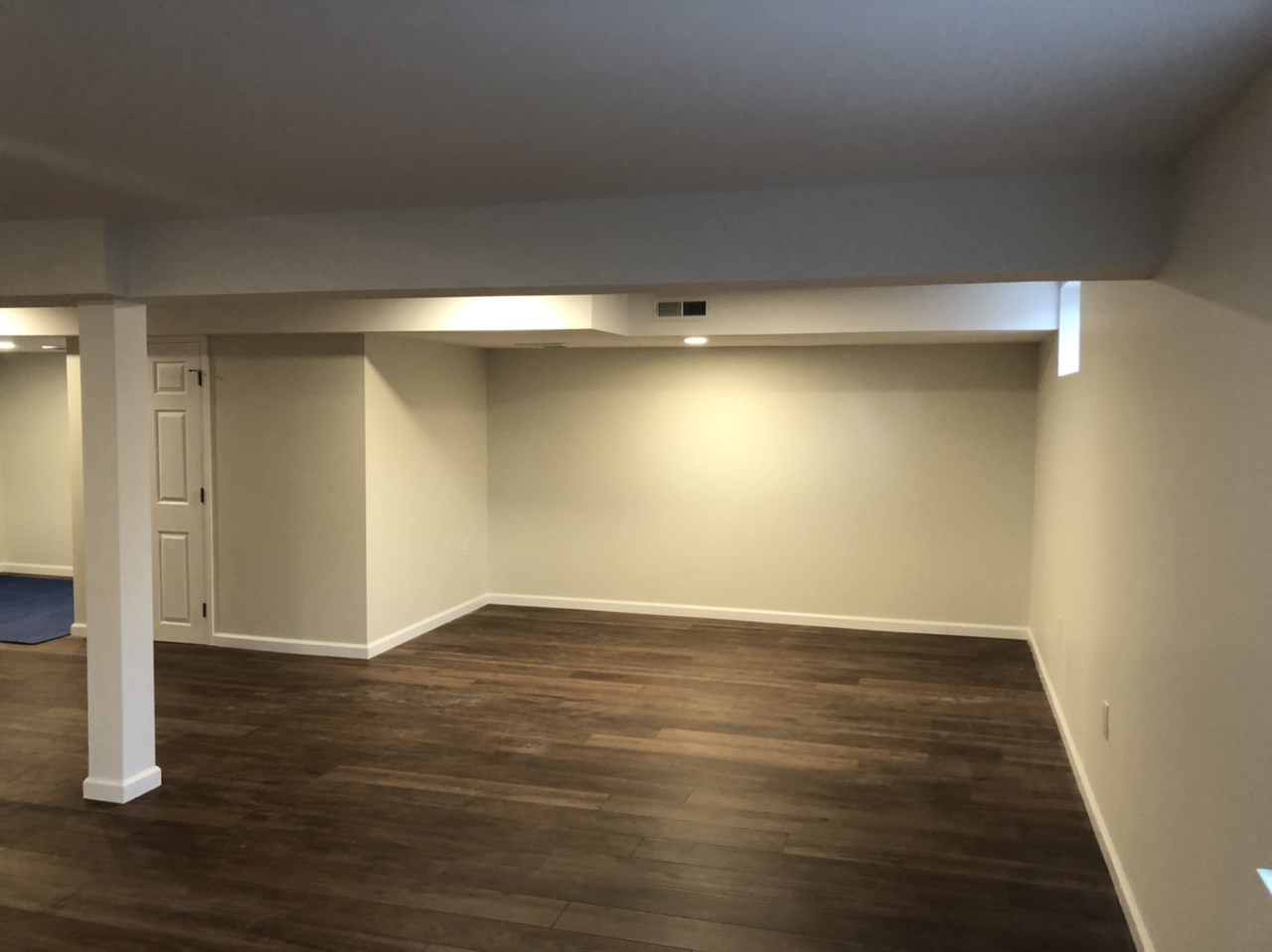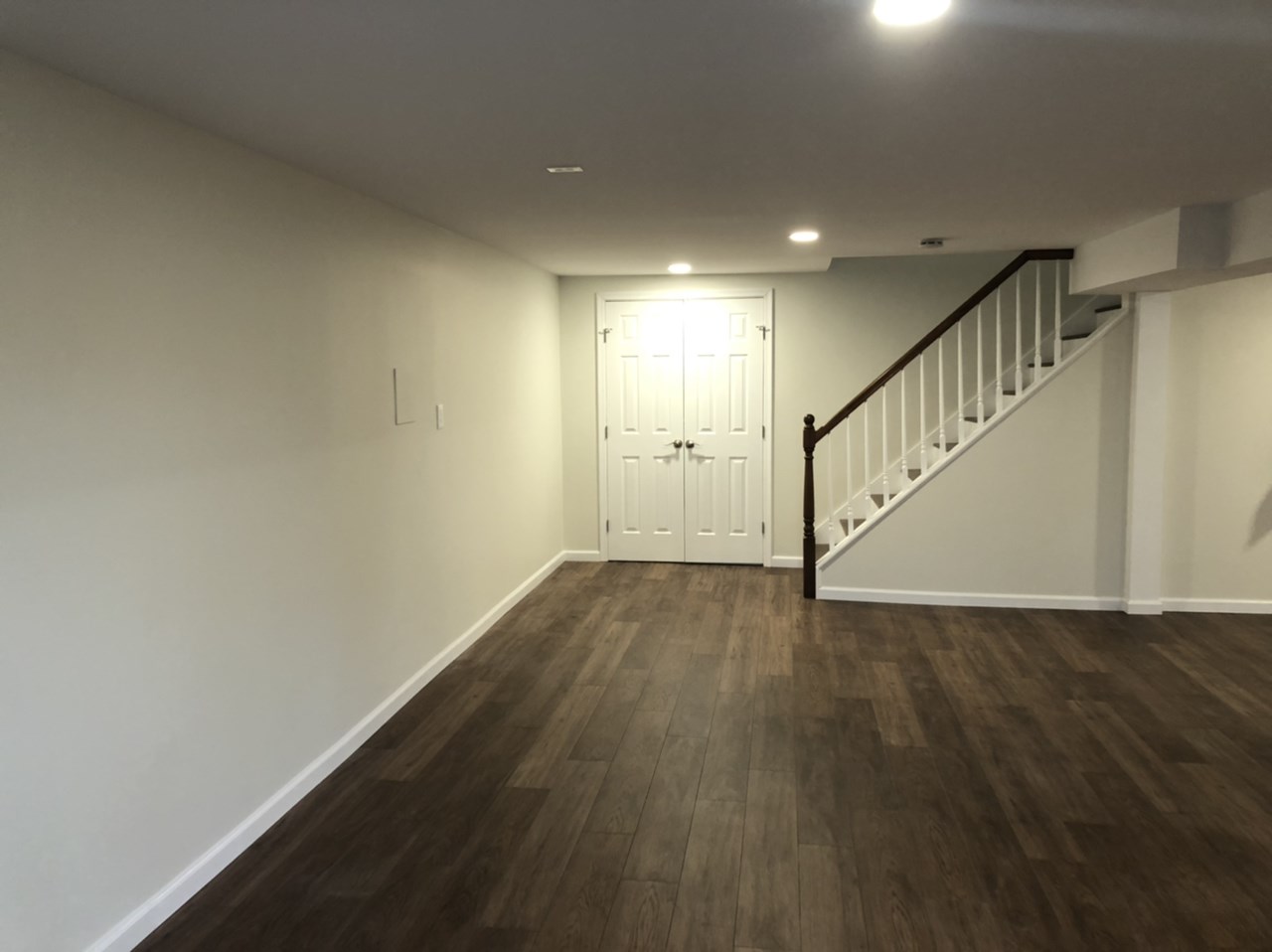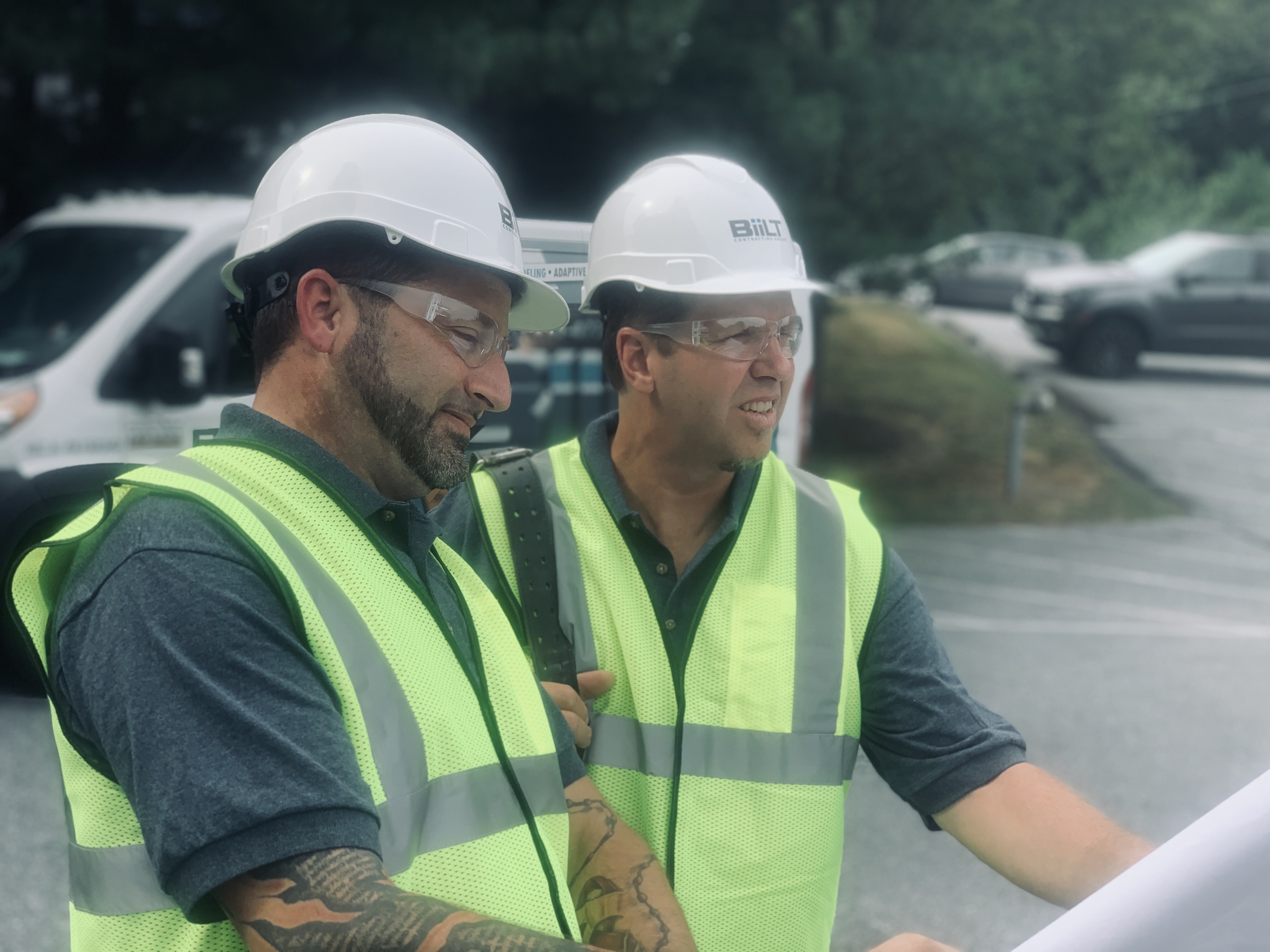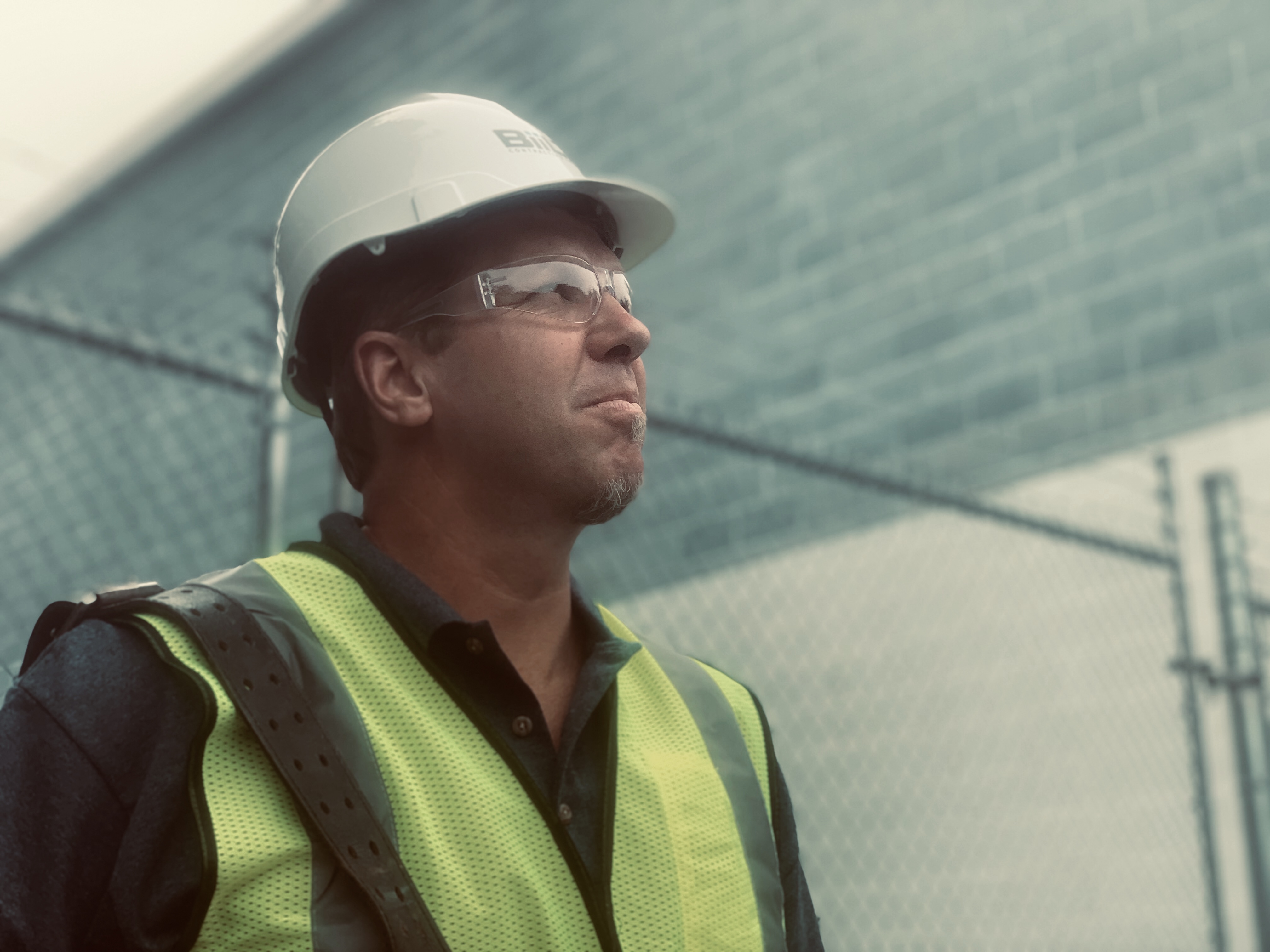
Expert Basement Remodeling in Harrisburg, PA
Basement remodeling in Harrisburg PA transforms underutilized spaces into valuable living areas that enhance both comfort and property value. Whether dealing with moisture challenges common to central Pennsylvania homes or navigating local building codes, professional basement renovation requires specialized expertise in waterproofing, structural modifications, and code compliance. We specialize in converting damp, unused basements into functional spaces like home offices, rental units, and family rooms while addressing the unique challenges posed by Harrisburg's high water tables and aging home infrastructure.

What Are the Most Popular Basement Remodels in Harrisburg?
Can I turn my basement into a bedroom or rental unit?
Converting basements into bedrooms or rental units represents one of the most sought-after remodeling projects in Harrisburg PA. According to Pennsylvania's Uniform Construction Code, basement bedrooms require specific safety features including proper egress windows measuring at least 5.7 square feet of openable area. Accessory dwelling units can generate approximately $1,401 monthly rental income in the Harrisburg metropolitan area according to RentCafe data, making basement conversions particularly attractive for homeowners seeking additional revenue streams.
Our basement bedroom conversions incorporate moisture-resistant drywall rated for below-grade applications and proper ventilation systems that meet Dauphin County's residential code requirements. We install code-compliant electrical systems with ground fault circuit interrupters (GFCIs) in all basement locations, ensuring safety while maximizing livable space. For rental unit conversions, we design separate entrances when feasible and include kitchenette installations that comply with Harrisburg's zoning ordinances for accessory dwelling units.
Are basement offices and gyms becoming more common locally?
Remote work trends have accelerated demand for basement home offices throughout Harrisburg and surrounding Dauphin County communities. The U.S. Census Bureau's 2023 American Community Survey indicates that 13.8% of U.S. workers usually worked from home, driving increased interest in dedicated workspace conversions. Basement offices offer sound isolation from upper floors and climate control advantages that make them ideal for video conferencing and focused work environments.
Home gym installations have similarly surged, with basement spaces providing optimal conditions for exercise equipment placement. We design gym layouts that accommodate proper flooring systems capable of supporting heavy equipment loads while incorporating rubberized surfaces that reduce noise transmission to living spaces above. Strategic placement of dehumidification systems maintains optimal humidity levels between 30-50%, preventing equipment corrosion and ensuring comfortable workout conditions year-round.

Why Do Homes in Harrisburg Need Basement Renovations?
What local housing features lead to basement moisture issues?
Harrisburg's geographic location along the Susquehanna River creates unique moisture challenges for basement spaces. The National Weather Service office in State College reports average annual precipitation of 41.5 inches for Dauphin County, with seasonal flooding risks that elevate groundwater tables. Many homes built before 1980 lack modern waterproofing membranes, relying instead on porous concrete block foundations that allow moisture infiltration during heavy rainfall events.
Clay-rich soils common throughout central Pennsylvania expand when saturated, exerting hydrostatic pressure against foundation walls that can reach 60 pounds per square foot. This pressure forces water through microscopic cracks and mortar joints, creating persistent dampness that damages finished materials and promotes mold growth. Our remodeling process addresses these challenges through comprehensive waterproofing systems including interior drainage channels, sump pump installations, and vapor barriers that prevent moisture migration through concrete slabs.
How do Harrisburg basements compare to newer construction?
Older Harrisburg homes typically feature 7-foot basement ceilings compared to the 8-foot minimums in modern construction, presenting design challenges for code-compliant conversions. Foundation materials in pre-1960 homes often consist of fieldstone or unreinforced concrete blocks that lack the structural integrity of poured concrete used in contemporary buildings. The Pennsylvania Department of Environmental Protection notes that homes built before radon-resistant construction practices became standard in the 1990s show elevated radon levels in 40% of tested homes across Pennsylvania.
Electrical systems in older basements frequently require complete replacement to meet current National Electrical Code standards, particularly regarding circuit capacity and grounding requirements. We encounter knob-and-tube wiring in historic Harrisburg properties that necessitates full rewiring before any finishing work begins. Plumbing systems may feature galvanized pipes prone to corrosion, requiring updates to copper or PEX materials that ensure reliable water supply and drainage for basement bathrooms or wet bars.



What's the Basement Remodeling Process with BiiLT?
How do we start with assessments and layout planning?
Our basement remodeling process begins with comprehensive structural and environmental assessments that identify existing conditions affecting project scope. We conduct moisture testing using professional-grade meters that measure concrete moisture content and relative humidity levels throughout the space. Concrete moisture levels must remain below 75% relative humidity before installing finished flooring materials according to common flooring manufacturer guidelines. This initial evaluation includes radon testing, foundation crack documentation, and thermal imaging to detect hidden moisture intrusion points.
Layout planning incorporates 3D modeling software that visualizes finished spaces while ensuring code compliance for ceiling heights, egress requirements, and mechanical system routing. We analyze existing HVAC capacity to determine whether supplemental heating and cooling systems are necessary for maintaining comfortable temperatures year-round. Electrical load calculations ensure adequate power distribution for planned uses, whether creating home theaters requiring dedicated circuits or workshops needing 240-volt outlets for equipment operation.
What materials are best for basements in Pennsylvania?
Material selection for Pennsylvania basements prioritizes moisture resistance and thermal performance suited to our climate's temperature extremes. We specify closed-cell spray foam insulation achieving R-values of 6.5 per inch, exceeding the Pennsylvania energy code requirement of R-10 for basement walls while creating effective vapor barriers. Mold-resistant drywall products containing fiberglass facings replace traditional paper-faced materials, preventing fungal growth even under elevated humidity conditions.
Flooring systems incorporate dimpled plastic subfloor membranes that create air gaps between concrete slabs and finished surfaces, allowing moisture vapor to dissipate without affecting flooring materials. Luxury vinyl plank flooring rated for below-grade installation provides waterproof surfaces that mimic hardwood aesthetics while withstanding potential moisture exposure. For bathroom installations, we use cement board substrates and waterproof membrane systems that prevent water penetration into wall cavities, protecting structural components from decay.
What steps are taken to ensure waterproofing and ventilation?
Comprehensive waterproofing begins with exterior foundation treatments when accessible, applying rubberized asphalt coatings that bridge minor cracks while maintaining flexibility through freeze-thaw cycles. Interior waterproofing systems include perimeter drainage channels connected to sump pumps with battery backup systems, ensuring continuous operation during power outages. The International Residential Code adopted by Pennsylvania requires sump pumps in areas with known groundwater issues, making these installations essential for Harrisburg-area basements.
Ventilation design follows ASHRAE 62.2 standards requiring 1 CFM per 100 square feet plus 7.5 CFM per occupant for basement spaces. We install energy recovery ventilators (ERVs) that exchange stale interior air with fresh outdoor air while recovering heating or cooling energy, maintaining indoor air quality without excessive energy consumption. Bathroom exhaust fans rated at minimum 50 CFM per fixture ensure adequate moisture removal, with ductwork routed directly to exterior terminations rather than into attic spaces where condensation could cause damage.

How Much Does Basement Finishing Cost in Harrisburg?
What's the average per-square-foot cost in central PA?
Basement finishing costs in central Pennsylvania typically range from $30-50 per square foot according to HomeGuide 2025 data, with variations depending on project complexity and material selections. Basic finishes including painted drywall, vinyl plank flooring, and standard lighting average $30-40 per square foot for 1,000+ square foot projects. Mid-range renovations incorporating bathrooms, custom built-ins, and enhanced lighting systems increase costs to $40-50 per square foot, while premium finishes with natural stone, custom millwork, and home theater installations can exceed $50 per square foot.
Labor costs in the Harrisburg market reflect regional wage scales that average 15-20% below major metropolitan areas like Philadelphia, providing relative value for comprehensive renovations. Mechanical system modifications including HVAC extensions, plumbing rough-ins, and electrical panel upgrades typically add $5,000-15,000 to base finishing costs depending on existing infrastructure conditions. Waterproofing improvements including interior drainage systems and sump pump installations range from $3,000-8,000 for average-sized basements, representing critical investments that protect finished spaces from moisture damage.
Do renovations qualify for financing or credits?
Several financing options support basement remodeling projects in Pennsylvania, including home equity lines of credit (HELOCs) currently averaging 7.5-8.5% interest rates. The Pennsylvania Housing Finance Agency offers home improvement loans up to $35,000 for qualifying homeowners, with below-market interest rates for energy efficiency upgrades. FHA 203(k) rehabilitation loans allow buyers to finance both home purchase and renovation costs, making basement finishing feasible for new homeowners.
Energy efficiency improvements incorporated into basement remodels qualify for federal tax credits under the Inflation Reduction Act, including 30% credits for heat pump installations and insulation upgrades meeting specified performance criteria according to IRS guidelines. Local utility companies like PPL Electric offer rebates for high-efficiency lighting and HVAC equipment installations that reduce long-term operating costs. We provide detailed cost segregation documentation that helps homeowners maximize available incentives while ensuring all work meets program requirements for credit eligibility.



What Should You Know About Harrisburg Building Codes?
What are egress window regulations in PA basements?
Pennsylvania's adoption of the International Residential Code establishes strict requirements for basement egress windows in habitable spaces. Chapter 3, Section R310 mandates minimum net clear opening of 5.7 square feet with no dimension less than 20 inches wide or 24 inches high. Window sills cannot exceed 44 inches above finished floor levels, requiring excavation and window well installations for many Harrisburg basements with limited above-grade exposure.
Window well dimensions must provide minimum 9 square feet of floor area with 36-inch horizontal projections from foundation walls, allowing emergency escape and rescue access. Wells exceeding 44 inches in depth require permanent ladders or steps spaced at maximum 18-inch intervals. We coordinate with licensed excavation contractors who understand local soil conditions and utility locations, ensuring safe installations that meet both code requirements and manufacturer specifications for drainage and structural support.
Does your basement need to meet fire and electrical codes?
Fire separation requirements for basement ceilings depend on intended use and whether spaces connect to upper floors via open stairways. Enclosed stairways require one-hour fire-resistant construction using 5/8-inch Type X gypsum board or equivalent assemblies that prevent fire spread between levels. Pennsylvania's Uniform Construction Code mandates interconnected smoke alarms on every level including basements, with carbon monoxide detectors required when fuel-burning appliances or attached garages are present.
Electrical installations must comply with the 2020 National Electrical Code adopted by Pennsylvania, requiring arc-fault circuit interrupter (AFCI) protection for all 15 and 20-amp branch circuits supplying basement outlets. Ground fault circuit interrupter (GFCI) protection extends to all receptacles within 6 feet of sinks, laundry areas, and unfinished spaces. We ensure adequate lighting levels meeting the one footcandle minimum for stairways according to IRC R303.7, incorporating LED fixtures that reduce heat generation while providing superior illumination quality.

How Long Does a Basement Remodel Take in Harrisburg, PA?
What factors affect remodeling timelines in older homes?
Basement remodeling timelines for older Harrisburg homes typically extend 4-8 weeks for standard projects, with complex renovations requiring 10-12 weeks from permit approval to final inspection. The City of Harrisburg Bureau of Codes processes building permit applications for residential projects, though historic district properties may require additional architectural review periods extending 2-3 weeks. Structural modifications including beam replacements or foundation repairs add significant time, particularly when engineering evaluations reveal conditions requiring remediation before finishing work proceeds.
Utility relocations present common delays in pre-1950s homes where mechanicals occupy prime floor space needed for room layouts. Moving water heaters, furnaces, or electrical panels requires coordination with licensed subcontractors and utility companies for service disconnections and reconnections. Discovering asbestos-containing materials during demolition triggers mandatory abatement procedures adding 1-2 weeks to project schedules while certified contractors perform safe removal.
How does BiiLT manage unexpected delays or inspections?
Our project management approach incorporates contingency planning that anticipates common challenges in basement renovations. We maintain relationships with multiple specialty subcontractors, ensuring backup resources when primary contractors encounter scheduling conflicts or material shortages. Weekly progress meetings with homeowners provide transparent communication about timeline adjustments, allowing families to plan around construction activities that may temporarily limit basement access or create noise disruptions.
Inspection scheduling follows predictable patterns based on Harrisburg's building department workflow, with rough mechanical inspections typically available within 48 hours of request during non-peak seasons. We coordinate multiple trades to complete rough-in work simultaneously, minimizing inspection-related delays that could otherwise extend project timelines. Digital project management platforms provide real-time updates on material deliveries, inspection results, and milestone completions, keeping all stakeholders informed throughout the renovation process.



How Can Waterproofing Protect Your Investment?
What techniques help prevent moisture and mold buildup?
Advanced waterproofing techniques for Harrisburg basements address both bulk water intrusion and vapor transmission through concrete. Interior drainage systems featuring corrugated piping surrounded by washed stone create pathways for groundwater to reach sump basins without saturating foundation walls. Properly designed systems maintain minimum 1% slopes toward collection points while incorporating inspection ports for maintenance access. These systems work synergistically with exterior grading improvements that direct surface water away from foundations at minimum 5% slopes for the first 10 feet.
Crystalline waterproofing admixtures applied to existing concrete penetrate up to 12 inches deep, forming insoluble crystals within pores and microcracks that block water passage while allowing vapor transmission. This technology, validated through research at Pennsylvania State University, provides permanent protection without surface coatings that could delaminate over time. We combine these treatments with closed-cell spray foam insulation that serves dual purposes: creating thermal barriers achieving R-15 values while preventing condensation on cool foundation surfaces during humid summer months.
Is radon testing necessary in Harrisburg homes?
Radon testing represents a critical safety requirement for Harrisburg basement conversions, as EPA mapping shows Dauphin County in Zone 1 with predicted average screening levels above 4 pCi/L. The Pennsylvania Department of Environmental Protection reports that 40% of homes tested statewide exceed the EPA action level of 4.0 pCi/L, necessitating mitigation systems for safe occupancy. Long-term testing over 90+ days provides accurate assessments of seasonal variations, though short-term tests can identify immediate concerns requiring remediation.
Our radon mitigation designs follow ANSI/AARST standards incorporating sub-slab depressurization systems that create negative pressure beneath foundations, preventing radon entry through cracks and joints. System components include 3-inch PVC piping routed from sub-slab collection points through roof terminations, inline fans providing minimum 1-inch water column suction, and monitoring devices confirming continuous operation. Post-mitigation testing consistently achieves levels below 2.0 pCi/L, providing peace of mind for families spending extended time in refinished basement spaces.

Why Choose BiiLT Group for Your Basement Conversion?
How does our team handle custom design and local compliance?
BiiLT Group combines architectural design expertise with deep knowledge of Harrisburg's building codes and permit processes, streamlining project approvals while maximizing creative possibilities. Our design team utilizes Building Information Modeling (BIM) software that identifies code compliance issues during planning phases, preventing costly modifications during construction. We maintain current licenses with the City of Harrisburg and surrounding municipalities, understanding nuanced requirements that vary between jurisdictions within Dauphin County's 40 municipalities.
Custom design solutions reflect each home's unique characteristics while addressing specific family needs and lifestyle preferences. We've developed specialized expertise in Victorian-era home conversions common throughout Midtown Harrisburg, incorporating period-appropriate details while meeting modern performance standards. Our portfolio includes creative solutions for challenging layouts, such as split-level entries that maximize ceiling heights and multi-zone HVAC systems that ensure comfort across varying basement elevations common in hillside properties near the Susquehanna River.



What's the ROI of Remodeling a Basement in PA?
Do remodeled basements add to resale value in local comps?
Finished basements in the Harrisburg market typically recoup 58% of investment costs, positioning them among the highest-ROI home improvements available. Local real estate data from the Greater Harrisburg Association of Realtors indicates homes with finished basements sell faster than comparable properties with unfinished lower levels, particularly important in competitive market conditions. Appraisers generally value finished basement square footage at 50-60% of above-grade space, adding $20,000-40,000 to typical Harrisburg home values for quality conversions.
Market analysis of recent sales in established neighborhoods like Camp Hill and Lemoyne shows premium valuations for basements featuring legal bedrooms with egress windows and full bathrooms. Properties with income-generating potential through separate entrance apartments command 8-12% price premiums over standard finished basements, reflecting strong demand for multigenerational housing options. We provide detailed documentation of improvements including permits, material specifications, and warranty information that supports maximum appraised values during refinancing or sale transactions.
How can a conversion generate rental income?
Basement apartment conversions in Harrisburg can generate substantial passive income streams, with one-bedroom units commanding $1,401, monthly rents depending on location and amenities according to RentCafe rental data. The city's proximity to state government offices, medical facilities, and educational institutions creates consistent rental demand from young professionals and healthcare workers seeking affordable housing options. Properly designed units with private entrances, dedicated parking, and separate utilities maximize rental potential while maintaining privacy for owner-occupants.
Investment returns achieve positive cash flow when financing improvements through home equity sources at current rates. Tax advantages include depreciation deductions for the rental portion of property and ability to deduct proportional maintenance, insurance, and utility costs as business expenses. We design rental units that comply with Fair Housing Act accessibility guidelines when feasible, expanding the potential tenant pool while future-proofing investments against changing demographics. Strategic amenity inclusion such as in-unit laundry connections and efficient kitchen layouts command premium rents that accelerate return on investment timelines.

What Questions Should You Ask Before Starting?
How do I prepare my space for a remodel?
Preparing basements for remodeling requires systematic decluttering and evaluation of existing stored items to determine retention needs. The National Association of Professional Organizers recommends sorting belongings before renovations, with particular attention to moisture-sensitive items requiring climate-controlled storage during construction. We provide detailed preparation checklists specifying which utilities require temporary relocation and identifying valuable items needing protection from construction dust and debris.
Homeowners should document existing conditions through photographs and videos before work begins, creating records for insurance purposes and project planning reference. Testing for hazardous materials including asbestos, lead paint, and radon should occur during preparation phases, allowing time for professional abatement if required. We coordinate with local storage facilities offering contractor discounts for clients needing temporary space during renovations, and our project managers assist with logistics planning that minimizes household disruption throughout the construction process.
What permits do I need in Dauphin County?
Permit requirements for basement remodeling vary between Dauphin County's 40 municipalities, though most follow the Pennsylvania Uniform Construction Code administered through local building departments. City of Harrisburg projects require building permits for structural modifications, electrical permits for circuit additions or panel upgrades, plumbing permits for fixture installations, and mechanical permits for HVAC modifications. Permit fees typically total $500-1,500 depending on project scope, with applications requiring detailed drawings showing existing conditions and proposed improvements.
Suburban municipalities including Susquehanna Township and Lower Paxton Township maintain separate permit processes with varying submission requirements and review timelines. Historic properties within designated districts require additional approvals from architectural review boards, potentially extending permit timelines. We handle complete permit packages as part of our service, leveraging established relationships with municipal officials to expedite approvals while ensuring full code compliance throughout the project lifecycle.


Get Expert Basement Remodeling in Harrisburg Today
Transform your unused basement into the living space you've always envisioned with BiiLT Group's comprehensive remodeling expertise. With our proven track record of successful conversions throughout Harrisburg and Dauphin County, we deliver moisture-proof, code-compliant solutions that maximize your home's value and livability. Contact us today at (717) 477-3250 to schedule your free consultation and discover how we can turn your basement into a beautiful, functional space that serves your family's needs for years to come.
